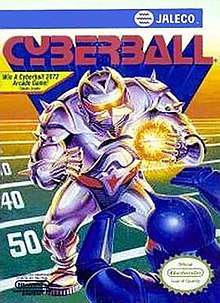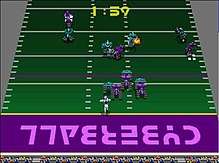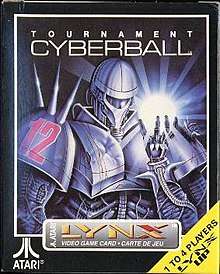Cyberball
Cyberball (サイバーボール, Saibābōru) is a video game released in arcades in 1988 by Atari Games. The game is 7-man American football using robotic avatars of different speeds, sizes, and skill sets set in the year 2022.
| Cyberball | |
|---|---|
 NES box art | |
| Developer(s) | Atari Games |
| Publisher(s) | Atari Games |
| Designer(s) | John Salwitz |
| Composer(s) | Brad Fuller Hal Canon Don Diekneite Byron Sheppard |
| Platform(s) | Arcade, NES, Genesis, Atari ST, Amiga, Commodore 64, Amstrad CPC, ZX Spectrum |
| Release | 1988 |
| Genre(s) | Sports |
| Mode(s) | Single-player, multiplayer |
The standard Cyberball cabinet has two monitors, each with two sets of controls for a maximum of four players, but Atari Games released single player and two player versions as well. A kit to convert Cyberball to its sequel, Tournament Cyberball 2072, was released in 1989.
Gameplay

The game replaces the standard downs system with an explosive ball that progresses from "cool" to "warm", "hot", and "critical" status as it is used. Players can only defuse the ball, resetting it from its current state back to "cool" by crossing the 50 yard line or by change of possession, whether through touchdown, interception or fumble. A robot holding a critical ball while being tackled is destroyed along with the ball. The robots also possess finite durability. As offensive units are tackled, they wear down, finally issuing smoke and then flames after a number of hits. A flaming robot will explode when hit, thereby fumbling the ball. Players can upgrade robots with faster and more durable units using money bonuses they earn during play. Players select from run, pass or option plays on offense, after which the computer presents four individual plays from which to choose. On defense, a player can select short, medium or long defenses, and then select a specific defensive scheme.
The standard configuration allows single player, two player cooperative, two player head-to-head or four player head-to-head play. Playing with two teams of two persons opened up a new dimension of gameplay. Computer-controlled avatars ran offensive patterns in very specific ways before reaching their assigned passing spots. Human players, however, could exploit the fact that a number of offensive plays started with identical formations. By choosing one play, but moving their avatars in imitation of a similar but different play, the offensive team could disguise their intentions before suddenly breaking for their assigned pass locations. This offensive flexibility forced defending players to quickly recognize plays and move to break them up by rushing to what they guessed was the intended passing spot. Most often, the timely use of the defender's turbo, a short-term speed boost usable once per play, would determine whether the play resulted in a missed pass, an interception, a long gain, or a score. This ability to improvise in four player mode built the popularity of Cyberball, leading to many tournaments across the United States for a period of time.
Ports
Cyberball was released for the Nintendo Entertainment System in 1992 by Jaleco. Tengen intended to release it unlicensed, but Jaleco purchased rights to publish it first. Ports were also published for the Sega Genesis, Atari ST, Amiga, Commodore 64, Amstrad CPC, and ZX Spectrum.
Tournament Cyberball 2072
| Tournament Cyberball 2072 | |
|---|---|
 Atari Lynx box art | |
| Publisher(s) | Atari Games |
| Platform(s) | Arcade, Lynx |
| Release |
|
Atari Games released Tournament Cyberball 2072 in 1989, which included the following changes:
- New "Game Breakers" mode
- Added Rookie mode
- Bugfixes, in particular the onside kick
- Added 100 additional plays
- Introduced the powerback
Cyberball cabinets could be upgraded to Cyberball 2072 via an Atari Games-produced piggyback board which updated them to the Tournament version.
References
External links
- Cyberball at the Killer List of Videogames
- Tournament Cyberball 2072 at the Killer List of Videogames
- Cyberball at SpectrumComputing.co.uk